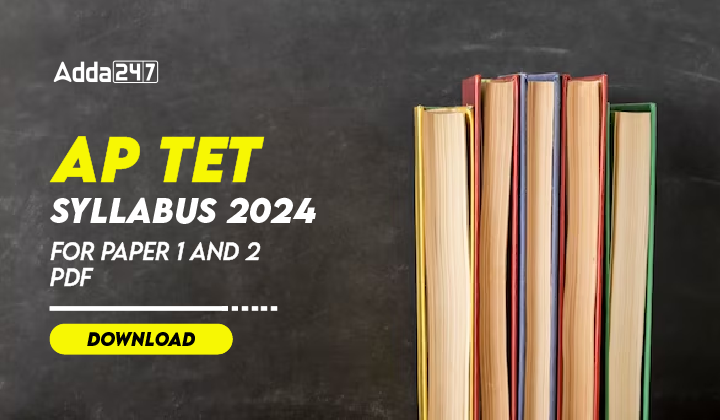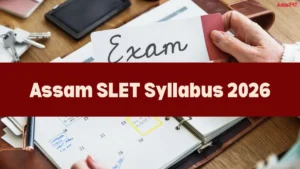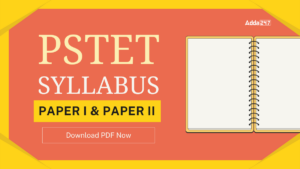Table of Contents
The AP TET 2026 Syllabus has been released by the Commissioner of School Education, Andhra Pradesh, along with the detailed notification on the official website. Candidates can visit the portal to download the complete syllabus or use the direct links shared below. With the syllabus now available, this is the right time for aspirants to begin their preparation with a clear understanding of the topics they need to cover.
This article includes all key details and direct access to the AP TET Syllabus 2026. Going through the syllabus carefully will help candidates plan their preparation better, identify important sections, and improve their chances of scoring well in the exam.
AP TET Syllabus 2026
Candidates preparing for the APTET exam should review the syllabus closely to understand its structure and the topics included. A clear picture of the syllabus makes it easier to plan a proper study routine and finish the subjects on time. By breaking down each section, aspirants can concentrate on important areas, manage their preparation better, and improve their chances of performing well in the exam.
AP TET Results 2026 Out – Click to Download
AP TET Syllabus 2026: Overview
The Andhra Pradesh Teacher Eligibility Test (APTET) is conducted by the Commissioner of School Education, Andhra Pradesh (CSEAP) to determine the eligibility of candidates for teaching roles in government and private schools across the state. This state-level exam is held online and evaluates applicants for Primary (Classes I–V) and Upper Primary (Classes VI–VIII) levels. It serves as an essential qualification for anyone aiming to build a teaching career in Andhra Pradesh. For a quick snapshot of the key exam details, check the table below.
| AP TET Syllabus 2026 | |
| Name of the Examination | Andhra Pradesh Teacher Eligibility Test (APTET) |
| Exam Conducting Body | Commissioner of School Education, Andhra Pradesh (CSEAP) |
| Level of Exam | State-Level |
| Mode of Application | Online |
| Mode of Examination | Online |
| Language of Medium | English and Language I were chosen by the candidate |
| Number of Papers |
|
| Duration of Examination | 2 hours and 30 minutes (150 Minutes) |
| APTET Exam Mode | Online |
| APTET Exam Pattern |
|
| AP TET Syllabus |
|
| AP TET Hall Ticket 2026 | Download Now |
| APTET Official Website | https://aptet.apcfss.in |
| Language | Kannada, Tamil, Odia, Hindi, Telugu, Urdu |
AP TET Exam Pattern 2026
Candidates preparing for the AP TET Exam 2026 should review the exam pattern closely to understand the marking scheme, weightage, and distribution of questions. This helps them plan a focused study approach and identify the sections that can boost their score. A solid grasp of the AP TET Exam Pattern also supports better time management during the test. The complete structure for Paper I (Sections A and B) and Paper II (Sections A and B) is given in the tables below, making it easier for aspirants to map out their preparation.
- The APTET exam will be conducted online as a computer-based test.
- The duration of the exam is 2.5 hours (150 minutes).
- Candidates must take the exam in English and a language of their choice from Kannada, Tamil, Odia, Hindi, Telugu, or Urdu.
- The question paper will contain a total of 150 questions.
- Candidates will receive 1 mark for each correct answer.
- There is no negative marking for incorrect answers in the entrance exam.
AP TET Paper 1 (A) Exam Pattern 2026
The AP TET Exam 2026 is conducted in two papers – Paper I and Paper II. Paper I is meant for candidates aspiring to teach Classes I to V (Primary Level), while Paper II is for those aiming to teach Classes VI to VIII (Upper Primary Level). Both papers consist of objective-type multiple-choice questions (MCQs).
Each paper includes five sections, with 30 questions per section, making a total of 150 questions for 150 marks. The subjects covered are Child Development and Pedagogy, Language I (Telugu, Urdu, Hindi, Kannada, Tamil, or Odiya), Language II (English), Mathematics, and Environmental Studies. Every section carries equal weightage of 30 marks, ensuring a balanced assessment of teaching aptitude, subject knowledge, and language proficiency.
| Subject | Questions | Marks |
| Child Development and Pedagogy | 30 MCQs | 30 Marks |
| The language I (Tel/Urdu/Hindi/Kannada/Tamil/ Odiya | 30 MCQs | 30 Marks |
| Language II (English) | 30 MCQs | 30 Marks |
| Mathematics | 30 MCQs | 30 Marks |
| Environmental Studies | 30 MCQs | 30 Marks |
| Total | 150 MCQs | 150 Marks |
AP TET Paper 1 (B) Exam Pattern 2026
The AP TET 2026 Paper 1 syllabus covers Child Development and Pedagogy, Language I, Language II (English), Mathematics, and Environmental Studies. Both Part A and Part B follow a similar structure, with slight variations in the Child Development and Pedagogy section to accommodate Special Education topics in Part B.
The exam consists of five sections with 30 multiple-choice questions each, totaling 150 questions for 150 marks. Each section carries equal weightage of 30 marks, providing a balanced assessment of teaching aptitude, subject knowledge, and language proficiency for aspiring regular and special education teachers.
| Subject | Questions | Marks |
| Child Development and Pedagogy (in Special Education) | 30 MCQs | 30 Marks |
| The language I (Tel/Urdu/Hindi/Kannada/Tamil/ Odiya | 30 MCQs | 30 Marks |
| Language II (English) | 30 MCQs | 30 Marks |
| Mathematics | 30 MCQs | 30 Marks |
| Environmental Studies | 30 MCQs | 30 Marks |
| Total | 150 MCQs | 150 Marks |
AP TET Paper 2 (A) Exam Pattern 2026
The AP TET 2024 Paper-II (A) is meant for candidates aiming to teach Classes VI to VIII. It is structured to evaluate both subject knowledge and teaching aptitude, ensuring a comprehensive assessment of candidates’ skills. The exam consists of six sections, with a total of 150 multiple-choice questions (MCQs) carrying 150 marks. Each section is designed to test specific competencies, helping aspirants demonstrate their readiness for upper primary teaching positions.
| Subject | Questions | Marks |
|---|---|---|
| Child Development and Pedagogy | 30 MCQs | 30 Marks |
| The language I (Tel/Urdu/Hindi/Kannada/Tamil/ Odiya | 30 MCQs | 30 Marks |
| Language II (English) | 30 MCQs | 30 Marks |
| Mathematics | 60 MCQs | 60 Marks |
| Social Studies | 60 MCQs | 60 Marks |
| Languages(Telugu/Urdu/Hindi/English/Kannada/Odiya/ Tamil and Sanskrit) | 60 MCQs | 60 MCQs |
| Total | 150 MCQs | 150 Marks |
AP TET Paper 2 (B) Exam Pattern 2026
The AP TET Exam 2026 Paper-II (B) comprises 150 multiple-choice questions (MCQs) for a total of 150 marks. It is structured to assess candidates’ teaching aptitude and subject knowledge across four sections. The sections include Child Development and Pedagogy (30 MCQs, 30 marks), Language I-Telugu, Urdu, Hindi, Kannada, Tamil, or Odiya (30 MCQs, 30 marks), Language II-English (30 MCQs, 30 marks), and Category of Disability Specialization and Pedagogy (60 MCQs, 60 marks). Each section evaluates specific competencies, ensuring a balanced assessment for Special Education teaching positions.
| Subject | Questions | Marks |
| Child Development and Pedagogy | 30 MCQs | 30 Marks |
| The language I (Tel/Urdu/Hindi/Kannada/Tamil/ Odiya | 30 MCQs | 30 Marks |
| Language II (English) | 30 MCQs | 30 Marks |
| Category of Disability Specialization and Pedagogy | 60 MCQs | 60 Marks |
| Total | 150 MCQs | 30 Marks |
APTET Syllabus 2026 For Paper I & II
Candidates must check out the AP TET Syllabus 2026 for Papers I & II. The AP TET Syllabus for Paper I & II is divided further into two parts- Part A and Part B (Special Educators). In the following section, candidates will find the detailed AP TET Syllabus for Paper I (Classes 1 to 5) and Paper II (6 to 8).
Child Development and Pedagogy (Part A)
Development, Growth & Maturation – Concept & Nature, Differences between Growth and Development
- Principles of development and their educational implication
- Factors Influencing Development – Biological, Psychological, Sociological, and Emotional
- Dimensions of Development and their interrelationships – Physical & Motor, Cognitive
- Emotional, Social, Moral, and Language relating to Infancy, Early Childhood, Late Childhood, Adolescence
- Understanding Development – Piaget, Kohlberg, Chomsky, Carl Rogers, Erikson
- Individual differences – Concept, Types of individual differences (Intra & inter), Factors of individual differences ( heredity & environment)
- Factors influencing individual differences in the areas of Attitudes, Aptitude, Interest, Habit, intelligence, creativity,
- Values, level of aspiration, self-concept, achievement – Intelligence: Concept and meaning of intelligence, Definitions, Types of intelligence, Theories of Intelligence, Aptitude, Interest, Attitude, Creativity, Thinking and Reasoning.
- Metacognition:- Meaning, Concept, Nature, uses, Aspects in the metacognition process, experimental learning
- Development of Personality – Meaning and concept of personality, definitions, characteristics, elements and factors of personality, theories of personality, assessment of personality(Projective and Non-Projective)
- Mental health, adjustment & behavioural problems, conflicts, frustration, tension, anxiety, maladjustment, and a defence mechanism.
- Methods and Approaches of Child Development: Introspection, Observation, Interview, Case Study
Experimental, Cross-sectional, and Longitudinal Developmental Tasks and Hazards.
Understanding Learning
- Learning – Meaning, Concept, Definitions, Characteristics of Learning, Types of Learning, determinants of learning, Readiness, Maturity & Motivation, Learning curves.
- Factors of Learning – Personal and Environmental • Dimensions of Learning – Cognitive, Affective, and Psycho–Motor.
- Motivation and Sustenance -its role in learning.
- Concept: Meaning, Definition, Formation of concept, Classification of concept, Types of concept, Concept Development, Role of teacher in conceptual development.
- Perception:- Concept, Meaning, Definitions, the process of perception, Characteristics, Laws of perceptual organisation, Influencing factors of perception.
- Memory & Forgetting
- Transfer of Learning- Approaches to Learning and their applicability: Behaviourism (Skinner, Pavlov, Thorndike), Gestalt (Kohler, Koffka), Observational (Bandura), Constructivism (Piaget, Vygotsky), Bruner’s theory of instruction, Experimental learning.
Pedagogical Concerns
- Teaching and its relationship with learning and the learner.
- Learners in Contexts: Situating learners in the socio-political and cultural context
- Children from diverse contexts – Children With Special Needs (CWSN), Inclusive Education.
- Understanding of pedagogic methods – Enquiry-based learning, Project-based learning, Survey, Observation, and
- Activity-based learning, Cooperative and collaborative learning. Individual and Group learning
- Issues and concerns concerning organising learning in the classroom, like Study habits, Self-learning, and Learning to learn skills.
- Organising learning in heterogeneous classroom groups: Socio-economic background
- Abilities and Interests.
- Paradigms of organising learning are centred, subject-centred, and learner-centred.
- Theory of instruction – Bruner
- Teaching as Planned Activity – Elements of Planning
- Phases of Teaching – Pre-active, Interactive, and Post-active
- General and subject-related skills, competencies required in teaching, and attributes of a good facilitator.
- Learning Resources – Self, Home, School, Community, Technology.
- Classroom Management: Role of a student, teacher, the Leadership style of teacher, Creation of a non-threatening learning environment, Managing behaviour problems, Guidance & Counselling, Punishment and its legal implications, Rights of a child, Time Management.
- The distinction between Assessment for Learning & Assessment of Learning
- ICT
Child Development and Pedagogy (Part B, Special Education)
Child Development
- Nature of Child Development
- Principles and approaches to growth and development
- Theories of Learning l Methods of Child Study
- Individual differences
Pedagogy in Special Education
- Characteristics and Educational Needs of Children with Special Needs
- Types and approaches to the assessment of Children with Special Needs
- Curriculum Development and Curricular Adaptations
- Concept of Individual Educational Plan and Individualised Family Services Plan
- Teaching Strategies for Children with Special Needs
Education Commissions and Policy (School Education)
- Constitutional provisions on education that reflect National Ideals: Equality, liberty, secularism, and social justice
National Commissions and Policies: Education Commission (1964), NPE and POA (1986, 1992), National Policy for Persons with Disabilities (2006) - National Acts: RCI Act, 1992, PWD Act, 1995, NT Act, 1999, RTE Act (2009 & 2012). RPWD Act 2016
- Programmes and Schemes: IEDC (1974, 1983), SSA (2000, 2011), RMSA (2009, IEDSS (2009
- International Conventions and Policies: Salamanca Declaration and Framework, 1994; UNCRPD, 2006; MDG, 2015; INCHEON strategies
AP TET Syllabus 2026 Paper I Maths (Part A & B)
- Numbers
- Mensuration
- Geometry
- Data Handling
- Algebra
- Arithmetic
- Pedagogy
AP TET Syllabus 2026 Paper I Environmental Studies (Part A & B)
- Living World
- Life processes
- Natural Phenomena
- Transportation and Communication
- Professions and Services
- Our Environment
- Our Universe
- Production Exchange and Livelihoods
- Political Systems and Governance
- Social Organisation and Inequities
- Religion and Society
- Culture and Communication
- Pedagogy
Why Read the AP TET Syllabus 2026?
The candidate will be able to understand the extent of the content they need to cover by going through the AP TET Syllabus 2026. It will help the candidates to formulate a routine for their preparation for the APTET Exam 2026. The candidates will be able to strategise their study plan minutely and precisely when they understand what and how much they have to prepare for the APTET Exam 2026. They will be able to keep track of their progress with the AP TET Syllabus 2026 if they check it regularly.
AP TET Syllabus PDF Download Link
In the following table, the candidates will find the APTET Syllabus PDF links. The candidates will have to click on the link adjacent to the APTET Syllabus Paper mentioned.



 Assam SLET Syllabus 2026 PDF Download Su...
Assam SLET Syllabus 2026 PDF Download Su...
 PSTET Syllabus 2026, Check Exam Pattern,...
PSTET Syllabus 2026, Check Exam Pattern,...
 Gujarat TAT Syllabus 2026, Download Pape...
Gujarat TAT Syllabus 2026, Download Pape...













